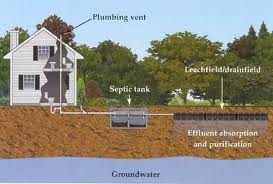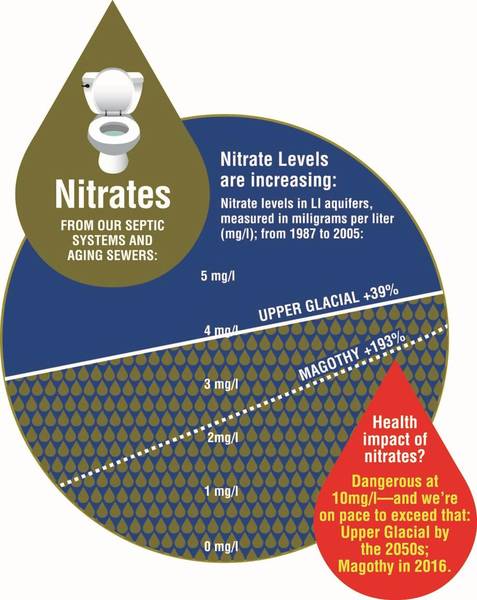Did you know that sharehouses (which are illegal on the east end) overwhealm septic sytems polluting our groundwater (drinking water)?
Last week I had the pleasure of running into Jay and David Shapiro at a party. The two brothers are famous – or shall I say infamous – for their organized business around share houses in “the hamptons”. It is a little known fact that sharing a house (by more than three unrelated people) is illegal according to most town zoning laws out east. Those who are informed of the illegality of shares tend to look the other way until noise or nuisance compels them. What seems to get lost in the noise is that share houses exponentially contribute pollutants – insert water/air/waste/noise/light – into an already overstressed and overpopulated environmental system.
Here’s an example of how share houses cause exponential harm as it pertains to water. Several years ago homes actually outstripped farmland as the primary source of pollutants into the water here on the east end. That transition placed the primary responsibility for our water eco-system with individual homeowners or guests in the case of share houses. Since the east end has no sewer system – waste from homes goes directly into the ground into tanks and pools designed to allow time and distance to filter it before hitting the underground water supply.  The cycle I just described is called the septic system (because it goes through a septic tank before hitting the pools but back to how this relates to share houses). This natural waste management cycle can be sustainable by closely monitoring the size and location of properties (acreage) and homes (resident allowance) and the size and location of those relative to the septic system. This balance is one of the main factors informing zoning laws all over the east end and even doubled up on near key drinking water sources.
The cycle I just described is called the septic system (because it goes through a septic tank before hitting the pools but back to how this relates to share houses). This natural waste management cycle can be sustainable by closely monitoring the size and location of properties (acreage) and homes (resident allowance) and the size and location of those relative to the septic system. This balance is one of the main factors informing zoning laws all over the east end and even doubled up on near key drinking water sources.
There is a carefully regulated balance of water, waste and population of every home on the east end. Share houses drastically throw that balance off. Whereas the average household on the east end is 2 (East Hampton) to 2.75 (West Hampton) people and the average septic system is meant to handle as many people, share houses can hold that many times [insert ridiculously implausible number]. The number of residents in a home are key to determining sustainable waste levels: zoning codes require more substantial septic systems for 5 or more bedroom homes and motels and hotels have still greater requirements and more elaborate waste systems. The importance of this balance is repeated again and again in the form of zoning laws and water and natural resource management laws up to the federal Clean Water Act.
The illegal (and easily avoidable) practice of dividing up summer rentals among more than a few people overburdens the carefully constructed system. When this happens pollutants (usually nitrates from human waste) are pushed into our shared groundwater source. All east end residents directly tap that same groundwater for drinking, bathing, etc. This is why share houses are of the utmost consequence to every resident of the east end and every person who cares to visit and drink tap water, eat local produce, or swim in our ponds.
By violating numerous zoning and population laws shares consume and produce much more than what is allocated or sustainable. The good news is we already have the regulatory and legal tools to prevent houses from being shared. Violations can be reported here: http://www.southamptontownny.gov/content/760/762/780/824/default.aspx and http://www.town.east-hampton.ny.us/HtmlPages/DivPubSafety/Ordinance/OrdinanceHome.htm and I will rely on readers to post their towns code violation reporting links.
Back at the party I informed Mr. Shapiro of these facts and urged him to cease his activity. I think he was humored by so much passion for conservation coming out of a party girl (that or he was still optimistic about getting my number) so I decided to push further – suggesting if he and his brother must break the law and operate a share-house business out on the east end, he attempt a “green house” and also get his septic systems cleaned/pumped/checked every week or so. Look out for these in summer 2013. Joking aside and in the meantime, we cannot rely on these entrepreneurs to regulate themselves or allow them to jeopardize our clean water sources. Reporting share houses is the green thing to do.
This Post Has 0 Comments